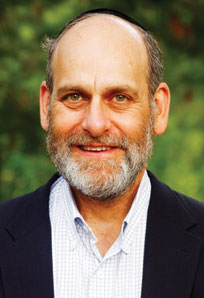 Being a scholar of Jewish philosophy didn’t come naturally to Alan Morinis, but when he discovered the tradition of Mussar, he knew he’d found a way to connect. Morinis, who founded the Mussar Institute in Vancouver, will be speaking at the community-wide Selichot service at 9 p.m. Saturday, Sept. 8, at Congregation Beth Torah on “the experience of yirah as the basis for a prayerful life.”
Being a scholar of Jewish philosophy didn’t come naturally to Alan Morinis, but when he discovered the tradition of Mussar, he knew he’d found a way to connect. Morinis, who founded the Mussar Institute in Vancouver, will be speaking at the community-wide Selichot service at 9 p.m. Saturday, Sept. 8, at Congregation Beth Torah on “the experience of yirah as the basis for a prayerful life.”
Morinis will also be leading other programs over the weekend. “What is Mussar and How Can It Change My Life?” will be at 6 p.m., Friday, Sept. 7, at The Temple, Congregation B’nai Jehudah. “Cultivating a Life of Gratitude through the Lens of Mussar” will be at 9:30 a.m. Sunday, Sept. 9, at the Jewish Community Center.
According to Morinis, the main difference between Mussar and regular group rituals is that when you study Mussar, you look inward at yourself, rather than outward at the community around you.
“So much of Jewish life is focused on the external,” Morinis said. Looking at personality faults “becomes the focus of the discipline, because each of us has certain traits in which we have the potential to grow. If we recognize that and … grow in that area, it ceases to become the problem area. People who are impatient can become patient. People who worry can get peace of mind.”
The particular area of Mussar Morinis will focus on at the Selichot program is yirah, which doesn’t have a direct English translation but refers to a feeling of fear, awe and reverence.
“If you’re standing at the edge of the Grand Canyon, you’ll have an experience of awe, because it’s such a dramatic and remarkable thing to see, but you’ll also have fear, because there’s the edge of the canyon, and it’s a long way down … and it’s all wrapped up in one,” Morinis said. “It’s very important to cultivate that inner sensibility. That’s how we know the presence of the divine in the world; when you have one of those experiences, it takes your breath away.”
Morinis, who made the transition from film producer to Judaic scholar 15 years ago at age 47, found the roots of this philosophy in the Torah. At the time, he did not consider himself to have a strong background of Jewish knowledge but found the philosophy accessible nonetheless.
“It’s aimed at helping us in helping us in our everyday reactions with the people who annoy us the most, (who are) the people we love the most, (and) cultivating the kind of person the Torah says we have the responsibility to be,” he said.
When he discovered Mussar, he researched the topic by himself in the library at the University of British Columbia in Vancouver. Although he didn’t know enough Hebrew to read the academic texts in their original form, he found that many of the books were available in English.
“Torah is the foundation,” he said. “It really has to do with the inherent mechanisms of human nature or ways in which we are programmed to change. It’s not an intellectual exercise; there’s learning involved.”
Because studying Mussar is an individual process, the experience will be different for each person, he said.
“We’re really good at collective (in Judaism), but the individual is different, and the Mussar traditionally addresses this and works with the fact of our uniqueness as a central focus. It’s not really prescribing for the collective,” Morinis said.
Although Morinis’ Mussar Institute is based in Canada, there are locals in Kansas City trained to lead classes for those who may be inspired by the Selichot program. Rabbi Alexandria Shuval-Weiner at The Temple, Congregation B’nai Jehudah is a qualified Mussar group leader and will hold Mussar classes in October and November.
Rabbi Shuval-Weiner wants to thank Ellen Miller and Irv Robinson for bringing Morinis to the community.
“Through their own study and engagement with the Mussar Institute, they have come to regard Alan Morinis as a wonderful teacher and inspiring leader. Because of their generosity, we are so very blessed to have the opportunity to study with Alan Morinis at various sites over the course of the weekend. The lessons he will bring are sure to enrich our work of Hesbon HaNefesh (an account of the soul), in preparation for the Holy Days. What a beautiful gift to our community!” Rabbi Shuval-Weiner said.
“Personally, I am looking forward to a special Mussar teaching that Dr. Morinis will be leading on Shabbat afternoon. This particular private session was made available to a select group of people from across the community who completed ‘A Season of Mussar’ with me during this past year,” the rabbi continued.
For additional information regarding Morinis’ Selichot presentation Sept. 8, visit www.kcrabbis.org or contact Annette Fish, Rabbinical Association administrator. While not mandatory, those attending are asked to respond by email to or by phone to 913-327-4622.
The Rabbinical Association of Greater Kansas City sponsors the Selichot program with support from The Jewish Federation of Greater Kansas City. The keynote speaker is made possible by a contribution from Ellen Miller and Irv Robinson, in memory of Freda Rose Miller.
More information regarding Morinis’ presentation on Sept. 7 at B’nai Jehudah can be obtained by calling 913-663-4050. Call 913-327-8077 for more information regarding the Sunday, Sept. 9, presentation at the JCC.
For more information about Rabbi Shuval Weiner’s Mussar class, call 913-663-4050. The class will run from Oct. 3 to Nov. 28 at B’nai Jehudah. Participants must register before the class begins.


